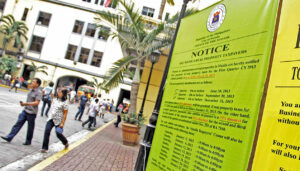House panel OK’s estate tax amnesty extension

THE HOUSE Ways and Means Committee approved on Tuesday a bill seeking to extend the estate tax amnesty period, which is set to end by mid-June, for another two years.
House Bill No. 7409 proposes to extend the period of availment of estate tax amnesty to June 14, 2025, from the current deadline of June 14, 2023.
Ways and Means Committee Chairman and Albay Rep. Jose Ma. Clemente S. Salceda said the tax amnesty has yet to be optimized.
“Families still struggle to comply with documentary as well as cash requirements. Hence, our leadership filed this measure to give more time to our constituents to clear their obligations,” he said during a committee hearing on Tuesday.
The bill was co-authored by House Speaker Ferdinand Martin G. Romualdez, Ilocos Norte Rep. Ferdinand Alexander A. Marcos, Majority Floor Leader Zamboanga City Rep. Manuel Jose M. Dalipe and TINGOG party-list representatives Yedda Marie K. Romualdez and Jude A. Acidre.
If passed into law, this would be the second extension of the estate tax amnesty under Republic Act (RA) No. 11213, which initially ran from 2019 to June 14, 2021. RA 11569, which was approved by the previous Congress, also extended the amnesty period for two years from June 15, 2021 to June 14, 2023.
Mr. Salceda noted the coronavirus pandemic had hampered many families’ attempts to settle their estates, which is why RA 11569 had removed the requirement of proof of settlement in the payment of the estate tax.
“I sincerely hope this will be the last time we extend RA 11213 — because it defeats the purpose of tax compliance if violations will always be forgiven,” Mr. Salceda said.
Erwin Vincent G. Alcala, national executive vice-president of the Philippine Institute of Certified Public Accountants, agreed saying this should be the last extension since the amnesty may be subject to abuse.
The current law gives taxpayers a one-time opportunity to settle unpaid tax obligations covering estates of those of decedents who died on or before Dec. 31, 2017. Under the law, a 6% tax rate is imposed on each decedent’s total net taxable estate at the time of death without penalties.
During the hearing, the Ways and Means Committee approved a provision that would exempt heirs from paying a 6% donor’s tax on any donated estates worth P1 million and below. This is an increase from the current P250,000 threshold under section 99 of the National Internal Revenue Code.
“There’s no longer a need for estate tax because you can already donate to your children before you die rather than ask them to pay a 6% estate tax after you die,” Mr. Salceda said.
The Bureau of Internal Revenue (BIR) had set a P6-billion target collection from the estate tax amnesty.
BIR Assistant Commissioner Maria Luisa I. Belen told the House committee that a total of 133,860 taxpayers have availed of the amnesty from 2019 to present, generating P7.4 billion for the government.
Broken down, 61,566 availed of the first estate tax amnesty from 2019 to June 14, 2021, which yielded P4.89 billion. Since June 15, 2021, the second extension has yielded P2.52 billion from 72,294 individuals so far.
Juanito H. Balbastre III, officer-in-charge of the BIR law and legislative division, addressed concerns that the process of availing the estate tax amnesty is tedious.
“We accept the availment of estate tax amnesty even without the proof of settlement considering it was clearly provided under the law that that requirement can be removed,” he told the committee, citing the BIR’s Revenue Regulations 17-2021.
The House of Representatives aims to pass the bill on second reading when session resumes on May 8. The bill is not included in the Legislative Executive Development Advisory Council’s common legislative agenda. — Beatriz Marie D. Cruz
![Photo of [B-SIDE Podcast] Transforming business through digitalization and innovation](https://redstateinvestings.com/wp-content/uploads/2022/11/10.25.21-B_Side_Varghese-1400x1400-1-300x300-biVRk5-300x220.jpeg)



